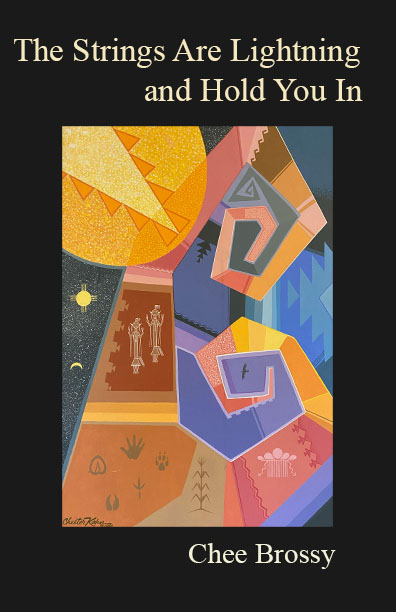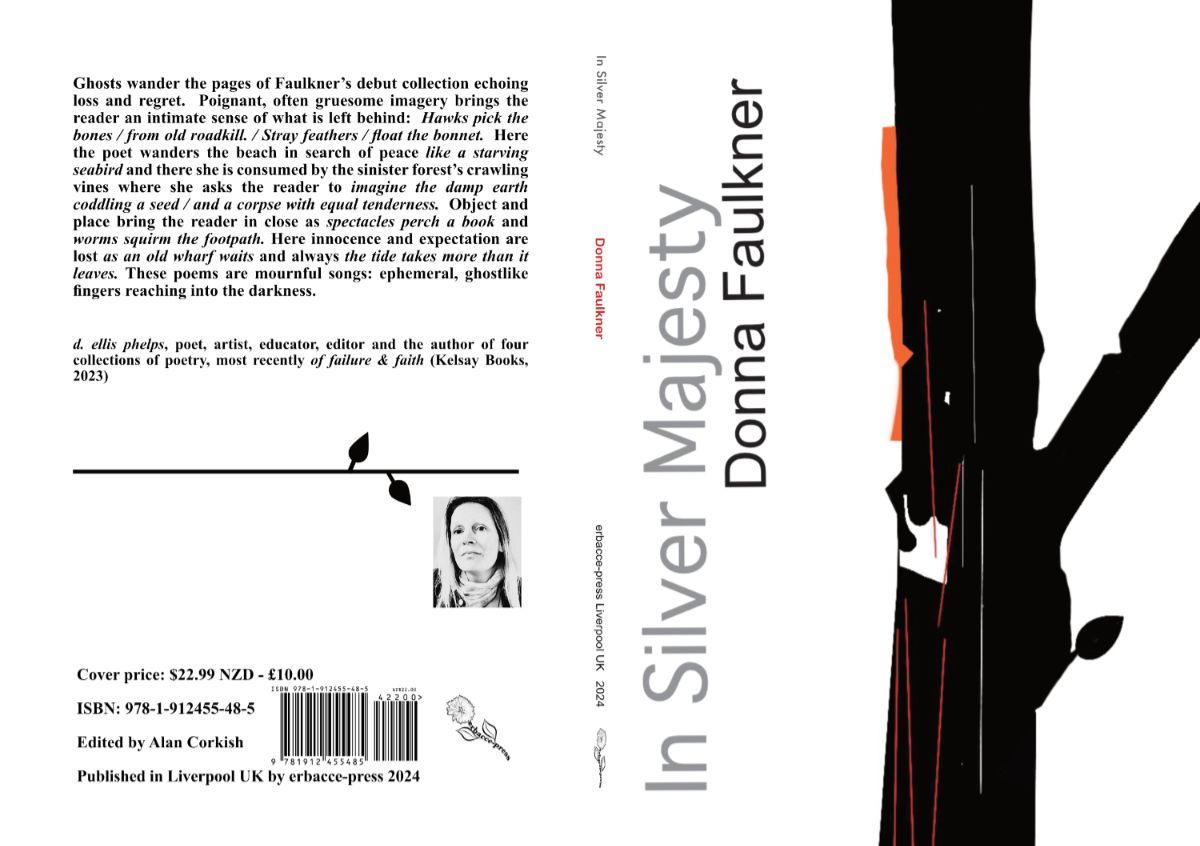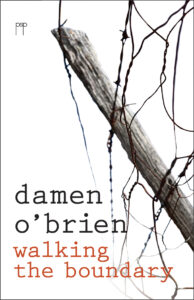 These poems challenge our preconceived notions and prescribed roles with fascinating imagery and provocative language that introduces Grassl own invented syntax. This unique use of language takes on visually significant forms. The subject matter encompasses dangerous and threatening conditions such as betrayal, life-threatening mental illness, the rigors of treatment, incarceration, and the end of the world.
These poems challenge our preconceived notions and prescribed roles with fascinating imagery and provocative language that introduces Grassl own invented syntax. This unique use of language takes on visually significant forms. The subject matter encompasses dangerous and threatening conditions such as betrayal, life-threatening mental illness, the rigors of treatment, incarceration, and the end of the world.
Tag: poetry
A review of Review of God is a river running down my palm by Jeremy Ra and Aruni Wijesinghe
 Poetry offers universality, and the importance of this chapbook lies in how two very different people—in background, ethnicity, gender, perception, and voice—convey this universality. Not just in theme, but in desire.
Poetry offers universality, and the importance of this chapbook lies in how two very different people—in background, ethnicity, gender, perception, and voice—convey this universality. Not just in theme, but in desire.
Bleeding Wilds: A Review of Country Songs for Alice by Emma Binder
 One of Binder’s many talents is their ability to transport you to any location at any time, but especially those environments inextricably tied to nature, to the wild, to those places that awaken instincts that lie within every human being. In one poem that takes us to “the plains” we are told, “You need hooves or adaptations, like how the fox twists her shadow into scrap metal, to camouflage herself from hunters in their cars.
One of Binder’s many talents is their ability to transport you to any location at any time, but especially those environments inextricably tied to nature, to the wild, to those places that awaken instincts that lie within every human being. In one poem that takes us to “the plains” we are told, “You need hooves or adaptations, like how the fox twists her shadow into scrap metal, to camouflage herself from hunters in their cars.
A review of Ekhō by Roslyn Orlando
 Orlando commences in the prologue describing Ekhō. According to Mythology Ekhō (Echo) was a nymph of mount Cithaeron in Boeotia. She was cursed by the goddess Hera, who condemned her to only repeat the words of others as punishment for distracting her with incessant chatter while Zeus pursued his affairs. The poet expertly builds a picture of Ekhō, characterising her with humour and vivid imagery.
Orlando commences in the prologue describing Ekhō. According to Mythology Ekhō (Echo) was a nymph of mount Cithaeron in Boeotia. She was cursed by the goddess Hera, who condemned her to only repeat the words of others as punishment for distracting her with incessant chatter while Zeus pursued his affairs. The poet expertly builds a picture of Ekhō, characterising her with humour and vivid imagery.
Poems as Reliquaries: Diane Seuss, Modern Poetry and Contemporary Faith
 The origins of Seuss’ work, as she reminds us repeatedly in Modern Poetry, are unpretentious. Her literary intellect has been assembled piecemeal from disparate elements, some Colette and Conrad here, a little Baudelaire and Morrison there. More importantly, her poetic prowess has evolved from a lifetime in lowdown trenches.
The origins of Seuss’ work, as she reminds us repeatedly in Modern Poetry, are unpretentious. Her literary intellect has been assembled piecemeal from disparate elements, some Colette and Conrad here, a little Baudelaire and Morrison there. More importantly, her poetic prowess has evolved from a lifetime in lowdown trenches.
A Review of The Strings Are Lightning And Hold You In by Chee Brossy
 The Strings Are Lightning And Hold You In, is a poetry collection that transcends time and history, weaving stories of tradition with the unfolding events of the present, connecting the wild with the domestic, and masterfully interlocking the spiritual with the tangible. In this collection, words become a conduit for much more than a story and yet are almost too little to contain its incandescent quality.
The Strings Are Lightning And Hold You In, is a poetry collection that transcends time and history, weaving stories of tradition with the unfolding events of the present, connecting the wild with the domestic, and masterfully interlocking the spiritual with the tangible. In this collection, words become a conduit for much more than a story and yet are almost too little to contain its incandescent quality.
A review of Identified Flying Objects by Michael Bartholomew-Biggs
 While they can be termed as confessional, there’re no calculated calls for pity or sympathy in them, (unlike quite a few contemporary poems). Rather, most poems look at the broader socio-historic picture and compute personal reflections with a sense of objectivity where possible.
While they can be termed as confessional, there’re no calculated calls for pity or sympathy in them, (unlike quite a few contemporary poems). Rather, most poems look at the broader socio-historic picture and compute personal reflections with a sense of objectivity where possible.
A review of In Silver Majesty by Donna Faulkner
 Skeletons, dusty books and stale bodies exist seamlessly alongside a newborn swimming in safe waters, and the bending of dandelions that don’t break. All imprinted firmly in Faulkner’s words, they peel back the cover on her own aches and elations about this experience of being human.
Skeletons, dusty books and stale bodies exist seamlessly alongside a newborn swimming in safe waters, and the bending of dandelions that don’t break. All imprinted firmly in Faulkner’s words, they peel back the cover on her own aches and elations about this experience of being human.
A review of The Natural World Somersaults by Shaine Melrose
 Melrose has a strong and distinct voice which stands out, with a language that is fresh, with a unique perspective. Her poems often carry multiple layers of meaning. On the surface the poems recount childhood memories and family stories, but deep reading reveals themes of identity, gender issues, sexual politics, and existential questions.
Melrose has a strong and distinct voice which stands out, with a language that is fresh, with a unique perspective. Her poems often carry multiple layers of meaning. On the surface the poems recount childhood memories and family stories, but deep reading reveals themes of identity, gender issues, sexual politics, and existential questions.
A review of Walking the Boundary by Damen O’Brien
 A majority of the poems in Walking the Boundary are award winners, and if you follow these awards, as I do, the poems will be familiar. As the title suggests, these are poems about liminal spaces and edges between worlds, timeframes, states of being, genres, genders, parent and child, and between the human and any number of places, creatures, emotions, or landscapes.
A majority of the poems in Walking the Boundary are award winners, and if you follow these awards, as I do, the poems will be familiar. As the title suggests, these are poems about liminal spaces and edges between worlds, timeframes, states of being, genres, genders, parent and child, and between the human and any number of places, creatures, emotions, or landscapes.